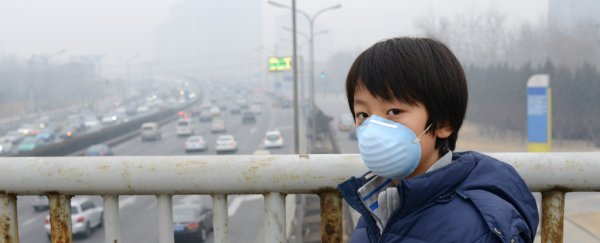Rats that breathe the polluted air in Beijing, China, for weeks at a time end up weighing up to 18 percent more than their peers living in clean air, a new study has found, revealing a worrying link between air pollution and obesity.
Even worse, the damage went beyond weight gain, with the Beijing rats also suffering from heavier lungs and livers, increased tissue inflammation, higher 'bad' cholesterol levels, and more insulin resistance - which is a key precursor of type 2 diabetes. The research is limited to rodents so far, but if the same thing is happening in humans, it could mean that air pollution is an even bigger threat to our health than previously thought.
"Since chronic inflammation is recognised as a factor contributing to obesity and since metabolic diseases such as diabetes and obesity are closely related, our findings provide clear evidence that chronic exposure to air pollution increases the risk for developing obesity," said lead researcher Junfeng 'Jim' Zhang from Duke University.
We already know that air pollution isn't good for us, with researchers estimating that it could lead to the deaths of more than 3 million people each year. But if these results are confirmed in humans, it could also help to explain why the rates of obesity and type 2 diabetes around the world have been steadily on the rise over the past 50 years.
In the experiment, Zhang and his team took pregnant lab rats and their offspring, and put them into two different chambers. One set of families was exposed to outdoor Beijing air, while the other chamber was attached to an air filter that removed most of the pollution.
Everything else about their treatment was identical, but after just 19 days, there was already a striking difference between the two families. The pregnant rats kept in the Beijing air had heavier lungs and livers than their counterparts, and also showed signs of increased tissue inflammation.
The Beijing rats were also heavier, despite being fed the same diet, and had 50 percent higher low-density lipoprotein (LDL) - or 'bad' cholesterol - than their peers; 46 percent higher triglyceride fats; and 97 percent higher overall cholesterol. Their insulin resistance - which is a precursor to type 2 diabetes - was also higher than the pregnant rats kept in the filtered air.
The offspring of these rats were kept in the chambers for an extra five weeks, during which time the impacts of the air pollution became more pronounced. At the end of the eight weeks, male rats that had been kept in Beijing air were 18 percent heavier than those in the filtered-air chamber, and female rats were 10 percent heavier.
The results "are consistent with other studies that show air pollution induces oxidative stress and inflammation in the organs and circulatory system", a Duke University press release explains.
To be clear, the research has only been done in animal models, and we can't automatically say that air pollution will have the same impact in humans. This latest study also wasn't able to identify exactly how air pollution was messing with the rats' metabolisms.
But it does indicate some of the pathways involved, and paves the way for further research both in animals and humans. "If translated and verified in humans, these findings will support the urgent need to reduce air pollution, given the growing burden of obesity in today's highly polluted world," said Zhang.
To be fair, China is already well aware it has a pollution problem - at the end of last year, the city issued its first-ever red alert, encouraging citizens to stay indoors, and over the weekend, Beijing announced that it's planning to establish ventilation corridors in the city to facilitate air flow and blow away smog and pollution.
But they're not the only ones with a problem - Los Angeles, Delhi, and London have all had serious issues with air pollution. In fact, London reached one of its yearly pollution limits in just eight days earlier this year.
Let's hope these findings put more pressure on governments to fix this problem once and for all. Because although there's more research to be done on this particular link, it's no secret that air pollution is making us sick. We're just now beginning to understand the extent of the damage.
The results have been published in The Official Journal of the Federation of American Societies for Experimental Biology.
